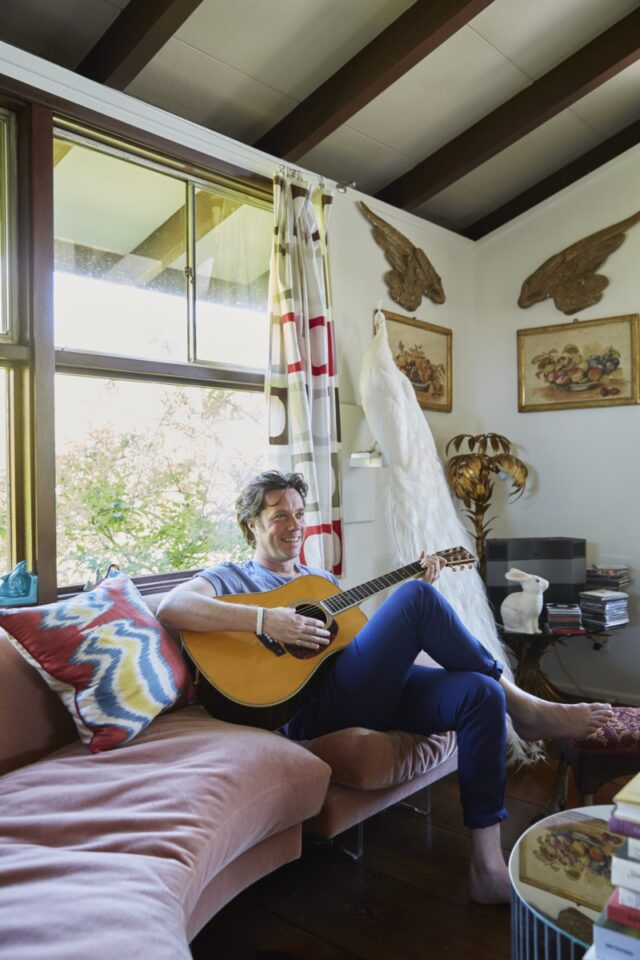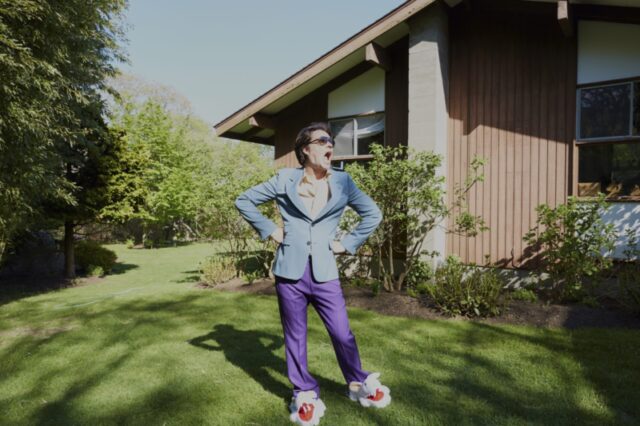
By Ray Rogers
Ray Rogers: The new album and the concert event in Montauk are both sort of homecomings. Is that fair to say?
Rufus Wainwright: Yeah. It wasn’t orchestrated as such, but I can’t help feel somewhat spooked by celebrating my 50th birthday this year and then looking at the cover of my album, and I’m a little kid there. There’s definitely a kind of cosmic triangle or something that’s occurring between Montauk, the album and my birthday. It’s all meant to be, I guess.
RR: I’ve followed your career from the very beginning. Your work has encompassed all kinds of genres and hybrids, from operatic pop to smoldering torch songs and so much more… Yet you haven’t done an album of folk songs before. Given the family lineage [folk icons Loudon Wainwright III and Kate McGarrigle are his parents] was it inevitable that you’d come around to it?
RW: Yeah, it popped up in my imagination after I watched the Grammys. My last album was nominated for a Grammy, and it’s always been very difficult to categorize me because there isn’t, in fact, a singer/songwriter category, so I’m always in these weird areas. I was watching them and then I noticed, oh my god, there’s all these folk categories and roots music and Americana. A light went off, and I said: I’m from that world. I grew up doing that as a kid and it made me start to really investigate that period of my life. And then also having lost my mother, and my father is in the second half of his 70s now, so it feels like the right time to take advantage of that ability and that knowledge but also celebrate that education and those who are still with us and those who sadly have departed.
RR: Montauk has seen some pretty seismic shifts since you bought your home here. What’s your impression of the place now?
RW: It’s changed dramatically since I first started going, about five or six years before I bought our house. So, it’s almost 20 years ago that I started coming in earnest. I feel like it’s leveled out a little bit in the sense that there was a point where it became so red-hot and so trendy, especially after Sandy. It was a bit crowded and all that. Now I feel like they might have moved on to something else a little more red-hot. I think the temperature’s gone down slightly. It’s no longer the kind of godforsaken place it used to be, which we all loved about it. It still maintains that quality occasionally. The beaches are still exquisite. Also, there’s always been a party atmosphere out there. It’s always been somewhat decadent and I think that has remained, which is fun.
RR: The title of the concert event is “50 Isn’t The End.” Turning 50, has this been a time of reflection for you?
RW: There’s a funny story behind that title, because originally the title was going to be “This Isn’t The End” and there was a big picture of me and people thought that it was like a funeral service. We had to put “50” in there to clarify it. It’s not going to be the Folkocracy show, it’s going to be a really unique show. A lot of the family will be there, friends, people like Jimmy Fallon and Tig Notaro, Laurie Anderson and Jenni Muldaur, so it’s going to be a totally unique evening of many people singing songs in honor of both me and my husband, who also turned 50 this year.
RR: We first met about 25 years ago when your debut album was about to come out. I’m curious what your impression is of who you were back then.
RW: Well, I think a lot about myself right now, and maybe it is because there’s a picture of me as a baby on my cover. So signing records, I have to stare at myself a lot, so it does engender thoughts. Sometimes I have to remember that I was a very special kid, and not in a way that I’m better than everybody or that I’m more worthy. I was really obsessed with music in an intense way and I sometimes think, Why aren’t all the kids today listening to Mozart operas? I was a weird kid and it was a wonderful and beautiful thing, but I also can’t expect the whole world to be like that. I don’t want to sound like I’m a total megalomaniac—I’m celebrating but also there’s a certain loneliness there. There’s a certain solitude. That’s the way it is.
RR: Looking at that journey to where you are now, what are you most proud of?
RW: That I did realize at a certain point in the midst of my musings, especially involving drugs and alcohol earlier on, that I really need to take care of my health. I need to take care of my body—and mainly because I’m a singer. If I drank all the time or smoked all the time and did crystal meth, I’d lose my voice. I was able to realize that and that was yet another instance where music saved my life. In order for me to perform it purely, I have to have all my cylinders going. That’s what I’m most proud of.
RR: What role has sobriety played in your life? Is it a daily struggle?
RW: I don’t tend to like to advertise my sobriety as this or that. I’ve had some ups and downs. It hasn’t been a clean slate. There’s been some wobbly times. Hitting 50 and still working as a musician and as a singer, so physically someone who has to really use their body 100 percent, I am just so cognizant of the fragility of my position, whether it’s the touring or with singing or just the grueling schedule that I have to keep. I’m thankful that I can give this lesson without it being from Yul Brynner in the hospital with tubes coming out of his nose, and by the time you hear this I’ll be dead. I’m able to do it from a position of strength and health and ability, and just guarantee people that if you take care of yourself you will be rewarded.
RR: Do you have a meditation practice or other ways of staying present?
RW: I could definitely use more of a meditation practice. One of the things that I really got into during COVID-19 was actually practicing my instruments, practicing piano specifically. I’ve been playing a lot of piano and also drawing. I got back into the visual arts. I started off going to art school years ago, so I’ve done a lot of drawing, and I started illustrating my songs. In fact, I created the illustration of the lighthouse for the Montauk show poster. For me, the visual arts have become incredibly meditative and incredibly focusing.
RR: What was it like to revisit your song “Going to a Town” with your good friend Anohni on the new record? Having Anohni, who is a transgender woman, duet on this imbues the track with extra resonance, given the nature of the song and where we are yet again culturally.
RW: It’s kind of a happy-sad situation, in a sense. I’m happy that the song is still relevant, but I’m also sad that the song is still relevant. It really is—we are experiencing now in the United States multiple traumas, whether it’s during or after the Trump years, and then this right wing extremism that’s coming back, or with the rise of antisemitism or anti-LGBTQ stuff. I’m a big Biden fan. You think for a second everything is great, and then the floor is ripped out from under you again. The song is very powerful still, which is both great and also kind of terrible.

RR: There are so many wonderful songs and collaborators on Folkocracy. What were a few performers or songs that were especially interesting to you?
RW: Singing with Chaka Khan [on “Cotton Eyed Joe”] was an incredible thrill and two nights ago we got to do it live at Walt Disney Concert Hall. Rufus singing with Chaka Khan. I mean, come on. It’s pretty iconic. I love all the special guests. They’re all fantastic but certainly being able to end it with my family on “Wild Mountain Thyme”—my sisters Martha and Lucy, and my cousin Lily and my Aunt Anna and Chaim—was so important. I think if that aspect wasn’t on the record, the anchor would be pulled up. I’m happy that we got that last number in with the family. That was a big part of my life.
RR: Is that a song that you and the family had sung in years past?
RW: Yeah, it was something we grew up singing. It’s a Scottish song. On both sides, whether it’s on the McGarrigle side or the Wainwright side, we always sang that song. It brought us all together.
RR: Music for many people can be a great healer, or at least a soothing balm in a pretty chaotic and tough world. In what ways does that resonate for you?
RW: I’m not one to usually promote music as a healing force or something. In fact, I tend to like music that disrupts your life and makes you want to do horrible things. With that being said, I do feel that this album might be more in that department only because—especially in this day and age where everything is so disposable and so technological and so digital and really impersonal—folk music is about coming together. It’s about communing, it’s about being in the same room at the same time and doing the same thing and trying to be in harmony and being about the moment. I think that’s a very valuable spirit to fight for these days. I don’t think it’s the way the world is going to be, necessarily, but I think it’s something the world shouldn’t lose track of, the idea of everybody being together in the same room and singing together and the power of that.
RR: Another strong force for you is the music of Judy Garland. You’ve done two Judy Garland tributes. What is the enduring appeal of her for you, and for the culture at large?
RW: Oh boy, she had it all at one point and then lost it all. Look, as a singer I’ve always been drawn to her and I’ve always admired her vocals so much and always emulated her a little bit. I actually just recently celebrated Memorial Day with her daughter Lorna out in Palm Springs. I’m a huge fan of old Hollywood and the star system and MGM musicals and stuff. I’m a victim of glamour, as they say.
RR: Montauk itself has been a source of inspiration over the years. I’m thinking of an old song, “Montauk,” sung to your daughter: “One day you’ll come to Montauk / And you will see your dad wearing a kimono / And see your other dad pruning roses / Hope you won’t turn around and go.” That is so hilarious. Your daughter is 12 now. What does she make of Montauk, and will she be at the show?
RW: Yeah. She’ll be around. She’s excited to come. She loves Montauk a lot. Sadly, during COVID-19 none of us could go, so that cut out a good chunk of time for her. That being said, she loves the big waves. What’s great about Montauk are the waves, the big beach as we say, just the power of that water when it’s really doing its thing.



